Draft Agreement on the withdrawal of
the United Kingdom of Great Britain
and Northern Ireland from the
European Union and the European
Atomic Energy Community
14 November 2018:
Personal Blogs
“It is the wound in Time. The century’s tides,
chanting their bitter psalms, cannot heal it.”
(Carol Ann Duffy, 2018)

"On 32 beaches around Great Britain the faces of those who served during World War One are being created in the sand. A picture of the British Army's first black officer Walter Tull is seen on Ayr Beach. He enlisted in the army in 1914, rose to become a 2nd Lieutenant and died in the Second Battle of the Somme at the age of 29."
https://www.bbc.co.uk/news/in-pictures-46169514
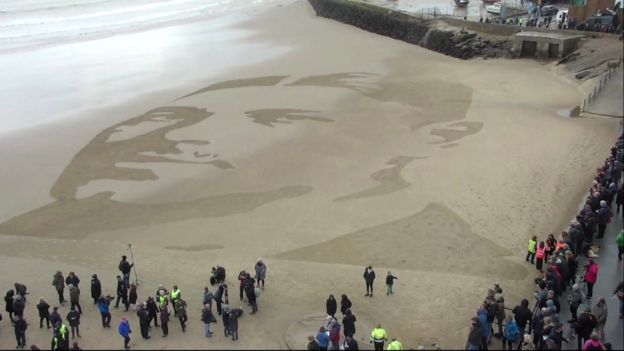
Wilfred Owen's image on Folkestone sands
https://www.pagesofthesea.org.uk/
https://www.pagesofthesea.org.uk/the-wound-in-time/
“The Piglet lived in a very grand house in the middle of a beech-tree, and the beech- tree was in the middle of the forest, and the Piglet lived in the middle of the house. Next to his house was a piece of broken board which had: “TRESPASSERS W” on it. When Christopher Robin asked the Piglet what it meant, he said it was his grandfather’s name, and had been in the family for a long time. Christopher Robin said you couldn’t be called Trespassers W, and Piglet said yes, you could, because his grandfather was, and it was short for Trespassers Will, which was short for Trespassers William. And his grandfather had had two names in case he lost one — Trespassers after an uncle, and William after Trespassers. “I’ve got two names,” said Christopher Robin carelessly.
“Well, there you are, that proves it,” said Piglet”.
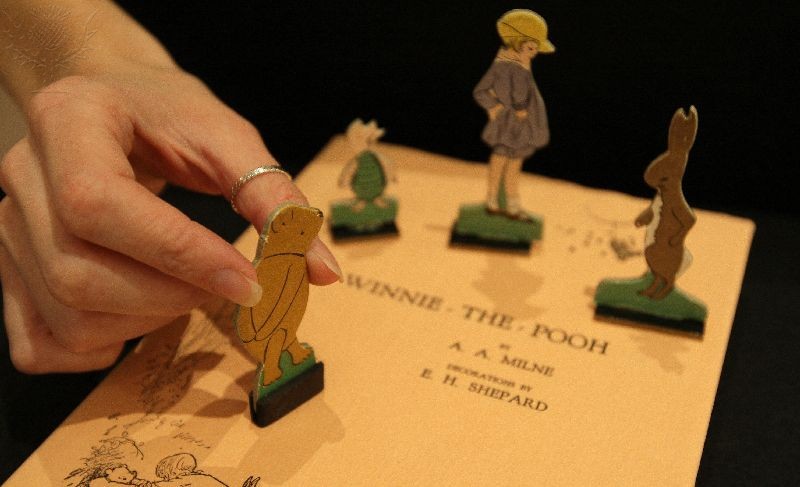
Image of A A Milne's characters from Britannia Imagequest
Koen Lenaerts, President of the Court of Justice of the
European Union (CJEU) since 8 October 2015, delivered an excellent lecture this evening at
Edinburgh University’s Playfair Library.
The lecture was the latest in an outstanding series deservedly celebrating the eminent constitutional scholar Professor J.D.B. Mitchell and marked 50 years since the founding of the Centre of European Governmental Studies in November 1968.
Professor Mitchell was the driving force behind the creation of this centre, pre-eminent in the UK in the study of the institutions, policy and law of the European Union and since re-labelled the Edinburgh Europa Institute.
Titled, ‘Judicial engineering in shaping the Union’s legal order. A tale of combining, distinguishing and balancing norms’, Koen Lenaerts’ lecture illustrated the way that the EU’s judicial engine-room operates in seeking to give effect to the EU’s treaty objectives; involving thoughts on matters such as competences, EU citizenship and the Internal Market.
A selection of cases was provided to illuminate how the CJEU operates. For example the way the CJEU operates in harmony with international law was demonstrated through cases such as Case C‑573/14 - Commissaire général aux réfugiés et aux apatrides v Mostafa Lounani.
Case C‑673/16 - Relu Adrian Coman, Robert Clabourn Hamilton, Asociaţia Accept v Inspectoratul General pentru Imigrări, Ministerul Afacerilor Interne - was used to show how the CJEU has sought to approximate the recognition of same-sex marriage across the EU and also to compare and contrast the operation of the CJEU with the US Supreme Court.
Interestingly, it was suggested that the CJEU could be viewed as following in the footprints of the US Supreme Court in so far as it was fulfilling the central constitutional role established, to a degree autonomously, for the US Supreme Court by Chief Justice John Marshall in the case of Marbury v Madison (1803).
Yet, in his influential book, Law’s Empire (1986), Professor Ronald Dworkin notes that the US Constitution could actually have been interpreted in a way that, instead, placed the power to test the legal power of Congress, a state or the president, in the hands of these constitutional actors themselves – operating under a legal and moral duty.
The US Supreme Court’s interpretation seems not too conceptually distant from the claim of heritage ingeniously construed, by Piglet, from the famous woodland sign ‘TRESPASSERS W’.
Indeed, it doesn’t seem too outrageous, hearing of the CJEU following in the footsteps of the US Supreme Court’s constitutional role – that initiative having no greater anchor in the constitutional framework of the US than having being seized, somewhat unilaterally, by the Court itself – to discern the limp of a constitutional Achilles’ Heel in those footprints.
SO a rather celebrated set of fictional footprints seemed to spring suddenly to mind – with the integrity of any claim of constitutional pedigree following Chief Justice Marshall’s judicial innovation rendered a little shaky by Professor Dworkin’s analysis.

Two sets of paw-prints
“Pooh says that it might be a Woozle, or it might not, and Piglet joins in with the tracking and walking in circles to see if they can find out for sure. And after a little while Pooh stops walking, and says that it's very funny, but there are now two sets of paw-prints, which means...well, what does that mean?”
(A.A. Milne’s Winnie the Pooh, chapter three: In which Pooh and Piglet go hunting and nearly catch a Woozle)
With news breaking tonight that the UK’s Brexit transition may be extended by a year, Mrs May appears to have taken a leaf from Scheherazade and her miraculous myths, tales and legends of the one thousand and one Arabian Nights.

Like Scheherazade, Mrs May appears to be fending off a grim schedule by keeping her intriguing tales from ever reaching a timeous end; "she always stops in an exciting place".
Indeed the enticement of what lies behind a closed door that tempts Salem, one of the characters in Sheherazade’s story-telling, seems also to have an equivalent in the ambition of a certain ex-Foreign Secretary to see for himself just what lies behind a certain door.
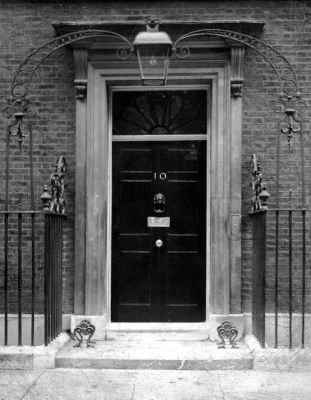
He should read the story of Salem who was also tempted to see what lay behind the door.
As Lady Hale thanked those who had provided submissions in the UK Supreme Court consideration of the Scottish Parliament's Continuity Bill, she
noted that this case was, “definitely one for the wet towels". This likely means that a
good deal of thought would have to be applied to these vexed constitutional
issues by the Supreme Court justices.
Judgment may not be delivered until the Autumn.
The difficulty of determining which legislative pupae will emerge as 'butterflies' deemed to be within the legislative competence of the Scottish Parliament and those Continuity Bill provisions which are instead to be considered as ultra vires 'moths' (see previous post) will seemingly be addressed by an agreed Schedule of the contested provisions.
This Schedule will identify whether the provisions are within Holyrood’s legislative competence and will be narrowed down and mutually determined for the Court’s convenience by both the Advocate General for the Westminster Government and the Lord Advocate from the Holyrood perspective.
However, as the tide of EU law goes out, and Westminster and Holyrood seek to determine who should properly have constitutional custody of the accumulated body of EU law - the acquis communautaire - left behind (bobbing on the surface, washed ashore or otherwise sunk) it seems not entirely inappropriate in the circumstances to view the matter of claiming the residual legal control jettisoned by EU law following UK secession as being broadly analogous to circumstances where flotsam, jetsam and lagan in water are claimed.
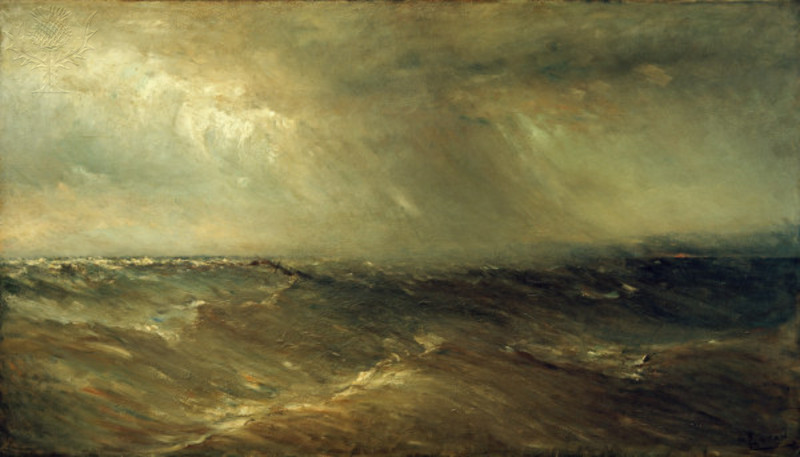
Flotsam (1871) by L Artan de Saint - with others in this topic from Britannia Images. Flotsam describes things floating on the water's surface. Jetsam is what washes ashore. Lagan is wreckage on the sea-bed usually marked by a buoy.
As the tide of EU law ebbs away the Scottish Parliament will be liberated from one of the restrictions on its legislative competence (Holyrood legislation will no longer need to accord with EU law under section 29(2)(d) of the Scotland Act 1998).
But just what will Holyrood be able to claim as its rightful salvage?
An extremely brief survey of the (Scots) law of property seems to suggest that the Crown (through the Crown Estates Commissioners) has the default claim.
It's worth pausing here to note that this point of property law has some scope to be considered analogous to the rights of 'constitutional salvage'.
Care has to be exercised in trying to make comparisons between distinct fields of law - there is no actual notion of constitutional savage - but the comparison, even if strained - might help understanding.
With that caution in mind discussion can return to property law.
Volume 18 (para. 102) of the Stair Memorial Encyclopaedia (SME) says that “water boundaries are particularly difficult”.
Variables including full sea, flood and spring tides with different land boundaries such as beach or otherwise all make fluid physical boundaries difficult to determine without a considered application of the law.
“In the Land Registration etc (Scotland) Act 2012 (asp 5), 'land' now includes the seabed of the territorial sea of the United Kingdom adjacent to Scotland (including land within the ebb and flow of the tide at ordinary spring tides)” (SME Vol. 18 para.105)
Then there is the instance of things foundering at sea as a result of ship-wreck: The SME later (para. 213) notes: “If at the end of a period of one year from the time when the wreck first came into the possession of the receiver no claim thereto has been established, the wreck will be delivered to the Crown grantee on payment of all expenses, costs, fees and salvage dues in respect thereof”.
Applied to the constitutional context, that suggests that the Scottish Parliament is wise to assert a right of 'constitutional salvage' to those aspects of EU law retained by Westminster that can properly be considered to be aspects of devolved competence.
Statute law has impacted upon - or solidified in legislation - the pre-existing common law that dealt with things jettisoned following a watery break-up. “Detailed rules for the administration of wreck are contained in the Merchant Shipping Act 1894…[Although there is no express exclusion in Part VI (ss 67–79) of the Civic Government (Scotland) Act 1982, it may be assumed that the provisions of that Part as to the disposal of lost and abandoned property are not intended to apply in the case of wreck].”
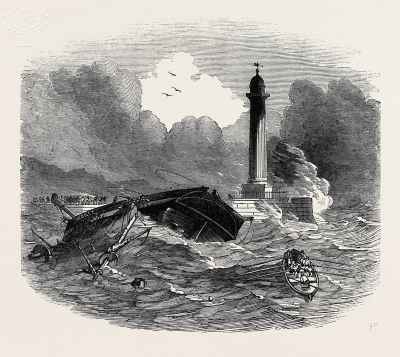
Loss of the Brig Vine of Bristol off Whitby (Britannia Image quest)
The Merchant Shipping Act 1995 now also addresses pollution. It may be that there are issues within retained EU law over which neither Westminster nor Holyrood will wish responsibility.
There is also an interesting case from the House of Lords, between the two World Wars, concerning the wreck of the brig Elizabeth that might speak to the likelihood of the UK’s membership of the EU being salvageable now that Article 50 of the Treaty on European Union has holed the UK’s EU position in the great continental convoy below the water-line:
"The Elizabeth , a brig, sailed from London in June, 1818, on a voyage to St. Petersburg and back to Portsmouth. She arrived in due course at St. Petersburg, and, having loaded a cargo of hemp and deals, she sailed thence on her return voyage to England on September 25. On September 27, "without the default of any person," she ran on to a reef of rocks near the Island of Gothland…
Here was a ship that had encountered what the law might call a semi-naufragium - full of water, as they themselves [that is, the seamen] state, so that they could not live on board. She is put into the hands of foreign carpenters for the course (a protracted course) of necessary repairs. It was doubtful whether she could at all receive such repairs as would restore her to a navigable state. It was by no means doubtful that she could not receive such repairs as would enable her to proceed till after the approach of spring in that climate had restored the seas to a navigable state, so as to allow her a passage."
Barras Appellant; v Aberdeen Steam Trawling and Fishing Company, Limited Respondents [1933] A.C. 402
Psyche
The butterfly the ancient Grecians made
The soul's fair emblem, and its only name--
But of the soul, escaped the slavish trade
Of mortal life !--For in this earthly frame
Ours is the reptile's lot, much toil, much blame,
Manifold motions making little speed,
And to deform and kill the things whereon we feed.

Samuel Taylor Coleridge’s poem Psyche (composed 1808) flutters around the Greek idea that the soul is like a butterfly which can be considered to be distinct from “the slavish trade of mortal life”.
The comparative drudgery of mortal life might, fairly reasonably, therefore be thought of as the caterpillar and contrasted with the “soul’s fair emblem” – the butterfly.
In contemplating the UK WITHDRAWAL FROM THE EUROPEAN UNION (LEGAL CONTINUITY) (SCOTLAND) BILL A Reference by the Attorney General and the Advocate General for Scotland today, Lord Reed in the UK Supreme Court has interjected into Lord Wolffe’s (Scotland’s Lord Advocate) oral submissions. Lord Wolffe is arguing that the UK Government’s challenge as to the legislative competence of the Scottish Parliament’s Continuity Bill (which seeks to channel EU laws currently relevant to Scotland to Holyrood rather than Westminster) should be dismissed. Lord Reed’s interjection was to stress the point that the notion of legislative competence is only applicable to an Act of the Scottish Parliament - not a Bill.
It may be a fundamental (perhaps insurmountable) conceptual difficulty, for that aspect of the UK Government's argument, that the Continuity Bill is, at present, only in its pupal stage.
That particular aspect of the case certainly doesn't nestle readily into the hands of the Court.
It is not, at this pupal stage, possible readily to assess the proper nature of the statutory creature that is yet to emerge on Royal Assent.
An additional difficulty is that the Reference encompasses questions regarding distinct provisions of the Continuity Bill – and the competence of the Continuity Bill as a whole.
If a competent Act, or provision, of the Scottish Parliament can be compared - on the one hand - to a butterfly. An Act, or provision(s) within the Holyrood Act, that might not be competent might – on the other hand – be compared to a moth.
Here the UK Supreme Court are asked to exercise foresight and determine whether the caterpillar will be a butterfly or a moth while the creature is still at the pupal stage.

That seems to require a problematic leap forward to the point that the Continuity Bill reaches the statute book.
The problem is that this could mean a return to the Court at a future date.
In an aside, both Lord Reed and Lord Sumption drew attention to the fact that the UK’s secession from the European Union is not, as yet, a done deal and is not, necessarily, a certainty. Given the Court’s proper constitutional position and the clear practice that judges do not, ordinarily, involve themselves in political questions, only the most ill-considered Press reports would portray such points as judicial politicking. The justices are simply contemplating the possibility that the primary scenario is not a certainty.
Possibly the more interesting avenue of discussion, with affirmative views from, amongst others, Lord Sumption, concerned scope for Holyrood to alter/expand its legislation on human rights. Human rights law in a devolved context might be a tangential, unanticipated, but extremely important, aspect of this case.
It does seem clear, however, that the case is symptomatic of the pressure of politics upon the law as a result of the Brexit process.
The Speaker of the House of Commons has had to suspend parliamentary proceedings mid-way through a Statement by the new Secretary of State for Exiting the EU (Dominic Raab) to allow the Government's White Paper on departing the EU to be distributed to MPs across the House to allow informed questions on the document to be aired.

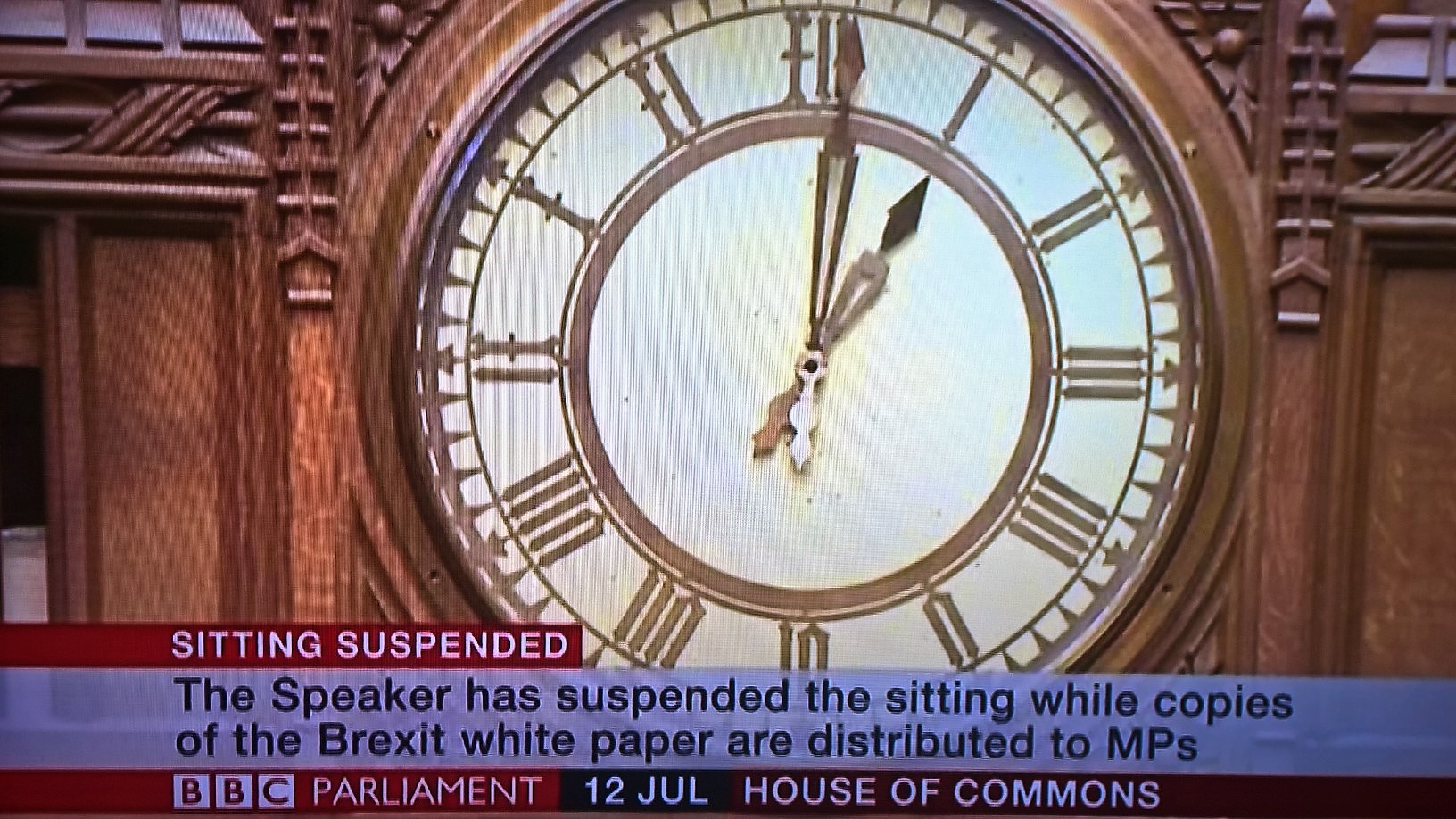
The delay did give the impression of a rather shambolic ordering of affairs particularly with the Press having had sight of the White Paper earlier in the morning (albeit subject to reporting restrictions ahead of the Secretary of State's statement).
What is a White Paper?
https://www.parliament.uk/site-information/glossary/white-paper/
The Government's White Paper on exiting the EU published just now:
It will be interesting to see if the Government will look to advance the notion that free movement will be ended by giving effect to the existing (but seldom used) restrictions on free movement. That would be a little like using a previously available, but little implemented, restriction to a club to control access. Alan Partridge seeking to enforce the denim clause at his Choristers members club springs to mind.
The fluidity of the notion of sovereignty means that there is scope to accommodate apparently competing claims. Not least the notion of sovereignty can float between legal and political currents of argument. The fluidity of the notion of sovereignty is a fundamental aspect of the debate on the consequences of EU membership and means that this central notion has remained open to construction since Parliament debated the EU Referendum Bill but exists also in the writing of Dicey upon which ideas relating to the notion of sovereignty are often founded.
Quite a stramash concerning parliamentary procedure at Prime Minister's Questions today.
Ian Blackford, the SNP's MP for Ross, Skye and Lochaber - and the SNP’s Westminster leader - asked for the House of Commons to sit in private which, among other things, would mean that TV proceedings would be cut.
Mr. Speaker opted, with advice from parliamentary counsel, to hear the issue at the end of PMQs. That appears to accord with the requirement that the related Motion be put ‘forthwith’.
Wishing an immediate hearing, Mr. Blackford pressed the matter and was asked to leave the chamber by the Speaker.
This resulted in all SNP MPs leaving with Mr. Backford - all vacated the Commons chamber.
This may, inadvertently, have allowed Mr. Speaker to avoid the confrontation postponed to the end of PMQs.
This heated event followed on from debate on retained powers being curtailed in yesterday's parliamentary schedule.
Interestingly, before the discussion of the Lords amendments arose as the latest stage of the Commons Brexit debate yesterday, a Ten Minute Rule Bill was presented by Fiona Bruce, Conservative MP for Congleton Commons relating to minimum alcohol pricing in England and Wales.
Legislation on that has just been implemented north of the border so Westminster, it seems, has followed Holyrood's lead on that particular matter (albeit through the vehicle of a Ten Minute Rule Bill.
However the introduction of the bill on minimum alcohol pricing was muted by the hubbub of excited conversation across the Commons that preceded the opening of the Brexit debate.
Mr. Speaker, on that occasion, did not, discernibly, call for order.
From these two instances it could be argued that Westminster is according Holyrood mixed levels of attention.
Whether or not the SNP's vacating proceedings en masse proves effective remains to be seen.
While the Prime Minister is attempting to sail her government through choppy political waters, Mr. Speaker seems to be subject to his own challenges in the Parliamentary engine room.
Motions that the House Sit in Private:
https://publications.parliament.uk/pa/cm201415/cmselect/cmproced/753/753.pdf
Ten Minute Rule Bills explained:
https://www.parliament.uk/site-information/glossary/ten-minute-rule-bill/
BBC 2's King Lear with Anthony Hopkins and an all-star cast might possibly give as good an insight into the Brexit process as anything offered from other quarters in that it concerns the redistribution of power to those purporting to integrity of purpose.
It is probably possible to see strands supporting each side of the Brexit debate within King Lear.
At minimum Lear's peregrinations between the Houses of Goneril and Regan seem to have all the same clumsiness as the seat of the EU Parliament being transient between Strasbourg and Brussels.
http://www.radiotimes.com/news/tv/2018-05-28/meet-the-cast-of-bbc2s-king-lear/
Sometimes a question can prompt a response that has more impact than might have been anticipated.
In Prime Minister's Question Time today Opposition leader Jeremy Cobyn, having listed some pro-customs union contributions to the debate from business and unions concerning a revised Customs Union relationship, asked the Prime Minister about the stance of the European Research Group advocating significant rupture from the EU trading bloc:
"Isn't it time she stood up to the people, described last night by the Father of the House, as these 'wild right-wing people'."
This was a reference to an interview given by Ken Clarke to BBC Newsnight the previous evening.
There was a time that televising of the Commons' proceedings was severely constrained and wider selective television shots were prohibited.
Fortunately that is not the case now and the camera panned, with perfect timing, to see the Father of the House, Ken Clarke, say, with a rueful chuckle, to his neighbour:
"I'd forgotten I'd said that".
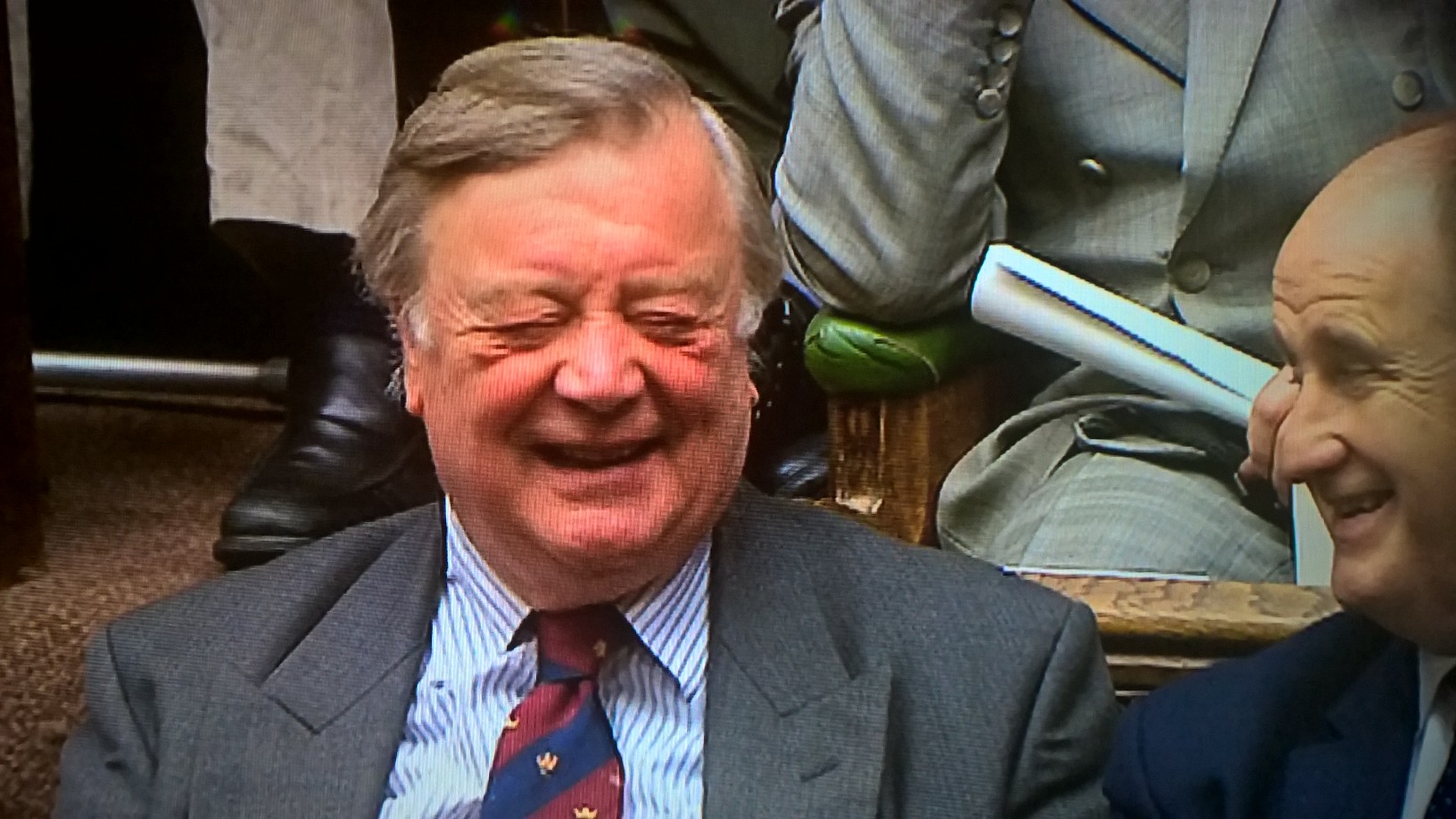
BBC Newsnight 08/05/18. Available (for 28 days) at:
https://www.bbc.co.uk/iplayer/episode/b0b2r0q0/newsnight-08052018
The Government’s ‘no deal’ Brexit approach may envisage the
Customs Union depart from these shores as under the sails that saw Childe
Harolde’s ship distance itself from the UK mainland powered by Lord Byron’s pen.
And fleeting shores receded from his sight,
Thus to the elements he poured his last 'Good Night.'
Canto the First, XXXIV, Childe Harolde’s Pilgrimage (Byron, 1812)
But MP for Normanton, Pontefract and Castelford , Yvette Cooper’s intervention, at Prime Minister’s Question Time yesterday attached a few barnacles to the hull of the Government fleet which might yet be felt by Ministers keelhauled in light of the staggering lack of communication between the Great Offices of State.
Indeed the Windrush, bobbing amidst the Government’s fleet, seems to be as welcome to 10 Downing Street as was The Fighting Temeraire to the French fleet off Cadiz.
Now, Yvette Cooper’s debate on the Customs Union after Brexit is looking like it could tangle the rudder of the Prime Minister’s flagship as some in the House of Commons seem to be inclined to drop anchor.
Might Byron’s words capture the consequences of setting course through stormy waters with an unsettled crew?
Probably not when enough of the crew have a windward ear to the cries from their constituencies to keep any hint of mutiny at bay.
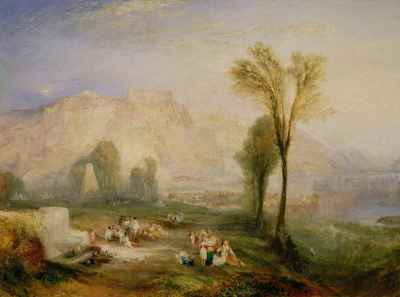
The Bright Stone of Honour, JMW Turner (1835). Source Britannia Image Quest
Yet could I seat me by this ivied stone,
Till I had bodied forth the heated mind,
Forms from the floating wreck which Ruin leaves behind.
Canto the Fourth, CIV, Childe Harolde’s Pilgrimage (Byron, 1812)
Bruce Adamson, Scotland’s Commissioner for Children and Young People since May 2017, issued a statement on 14 March 2018 welcoming the rise in the age of criminal responsibility from age 8 to 12 in the Scottish criminal justice system but pressed for more:
“Along with raising the age of criminal responsibility higher than 12, more efforts need to be made to intervene early, helping families in crisis and supporting children at risk, to address the root causes of the behaviour. Research shows that many of these children have complex or traumatic childhood experiences, so we need community-based early intervention services that are well-resourced and quickly accessed, particularly mental health and intensive support services. I welcome the Scottish Government’s commitment to continuing to progress raising the age of criminal responsibility further".
Scotland’s age of criminal responsibility is rising to 12. Now, it needs to go higher than the “absolute minimum” acceptable, 14 March 2018. Available at: https://www.cypcs.org.uk/news/in-the-news/scotlands-age-of-criminal-responsibility-is-rising-to-12-now-it-needs-to-go-higher-than-the-absolute-minimum-acceptable
As Sergey Lavrov and Lord West’s recent contributions to the Syria debate - which debate later focussed in the House of Commons on a Motion by Labour MP for Wirral South Alison McGovern on the current situation in Syria and the Government’s response - have made clear, a more serious matter than that which is currently challenging the United Nations it is hard to imagine.
Watching the Prime Minister conclude the Syria debate, with a ruffled looking Foreign Secretary Boris Johnson sat behind the her on one side and a yawning (it was approaching Midnight and had been a long day) Defence Secretary Gavin Williamson behind her on the other side, a fanciful picture of the day’s Cabinet meeting based on the introduction to Alan Bennett’s History Boys (albeit the context there is a Bill on the criminal justice system) sprang unbidden to mind.
The History Boys: A Play
Act One
Irwin is in a wheelchair, in his forties, addressing three or four
unidentified MPs.
IRWIN This is the tricky one.
The effect of the bill will be to abolish trial by jury in at least half the
cases that currently come before the courts and will to a significant extent
abolish the presumption of innocence.
Our strategy should therefore be to insist that the bill does not diminish the
liberty of the subject but amplifies it; that the true liberty of the subject
consists in the freedom to walk the streets unmolested etc., etc., secure in
the knowledge that if a crime is committed it will be promptly and sufficiently
punished and that far from circumscribing the liberty of the subject this will
enlarge it.
I would try not to be shrill or earnest. An amused tolerance always comes over
best, particularly on television. Paradox works well and mists up the windows,
which is handy. 'The loss of liberty is the price we pay for freedom' type
thing.
https://us.macmillan.com/books/9780571224647
That note of cynicism was perhaps triggered by the publication of information by the Digital, Culture, Media and Sport Committee today giving insight into “the private thoughts of key people at Leave.EU and SCL” - as the Chair’s summary puts it:
This based on the work of Dr. Emma L. Briant, University of Essex, on SCL which she describes as “a conglomerate of companies including Cambridge Analytica who did work for the Trump campaign”.
Talking of traditions and April Fool's Day pranks:
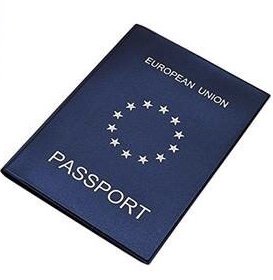
Courtesy of the UK office of the European Parliament in London twitter account.
Section 4 of the Social Care (Self-directed Support) (Scotland) Act 2013 (the 2013 Act) came into force on April 1, 2014 placing a duty on local authorities to ensure clients are offered a range of choices on how they receive their social care services and support.
The Social Care (Self-directed Support) (Scotland) Act 2013
Section 4
Options for self-directed support
(1)The options for self-directed support are—
Option 1: The making of a direct payment by the local authority to the supported person for the provision of support.
Option 2: The selection of support by the supported person, the making of arrangements for the provision of it by the local authority on behalf of the supported person and, where it is provided by someone other than the authority, the payment by the local authority of the relevant amount in respect of the cost of that provision.
Option 3: The selection of support for the supported person by the local authority, the making of arrangements for the provision of it by the authority and, where it is provided by someone other than the authority, the payment by the authority of the relevant amount in respect of the cost of that provision.
Option 4: The selection by the supported person of Option 1, 2 or 3 for each type of support and, where it is provided by someone other than the authority, the payment by the local authority of the relevant amount in respect of the cost of the support.
Information on the Self-directed Support and its uptake in 2015-16 can be found at:
https://beta.gov.scot/publications/self-directed-support-scotland-2015-16/
“Every one of the Brexit promises is – to quote Henry Fielding – ‘a very wholesome and comfortable doctrine to which (there is) but one objection: namely, that it is not true’”
In a speech only slightly less stormy and disruptive than today's weather (as the 'Beast from the East' sweeps across the UK bringing Scotland's first Met Office 'Red Alert') John Major - a significant actor in the discussions in the early 1990s leading up to the Good Friday peace agreement in Northern Ireland - has fired a broadside directly at Prime Minister Theresa May's Brexit policy:
An extraordinarily powerful speech was given by Baroness Jowell in the House of Lords this afternoon.
It led to a rare, but wholly appropriate, standing ovation.
Baroness Jowell quoted Seamus Heaney's last words, "Noli Timere".
On the anniversary of the Scottish Bard's birthday the last words of his Irish peer rang out with universal reach:
"Do not be afraid".
http://www.parliament.uk/business/news/2018/january/lords-debates-innovative-cancer-treatments/
As plunging temperatures down to -29C chill the US in early
January 2018 – with snow seen even in Florida – perhaps a more disconcerting
chill might be discerned in President Trump’s comments (and facial expressions)
whilst speaking at a press conference today at Camp David where the legislative
agenda for 2018 will be under discussion.
President Trump asked Mitch McConnell, Republican Senate Majority leader to contribute from the podium.
Mitch McConnell advocated a right-of-centre position for the country - the UK's political right being broadly equivalent to the US left gives that some perspective - and noted his welcome to President Trump's "spectacular" nominee to the US Supreme Court (Neil Gorsuch) along with 12 Circuit judges in 2017, "the most in the first year of any President since the Circuit Court system was set up in 1891".
The US Vice-President, Mike Pence, also noted judicial appointments to uphold the rule of law and the Constitution as highlights of 2017.
Could this, arguably, be considered ‘stacking in the deck’ and anticipating judicial support for President Trump’s policy preferences?
Asked about his reaction to the unflattering image of his Administration following publication of Michael Wolff's book, 'Fire and Fury', President Trump dismissed Michael Wolff’s accounts.
President Trump said – almost in an aside - that the libel laws in the US are “very weak; if they were strong it would be very helpful. You wouldn’t have things like that happen where you can say whatever comes into your head.”
Comments made aside the main stream of discussion, can offer a useful peek behind the veil of political policy.
Emphasis is added, above, to the phrase, “it would be very helpful” because President Trump paused momentarily at that moment, noticeably breathing in, his eyes looking up to his top left - where he seemed to be envisaging a better world - as he expressed that phrase, before switching with an affirming micro-nod of his head and eyes set back to the journalist who asked the question.
From this little acorn of facial expression regarding US libel law may grow an oaken policy stance on free speech – certainly set against the kind of ‘Fake News’ that airs unfavourably against President Trump.
However, even if it proves “very helpful” to throw out the ‘Fake News’ bathwater with a legislative chill on free speech in the US, the democratic concern is for the baby in that bathwater.
Not everybody critical of US government policy is necessarily a pedlar of fake news. Just because what is said is antithetical to particular political interests does not render the view unworthy.
This may, possibly, have dawned on President Trump today.
Experts of facial expressions and micro-glances will also have noted the President’s eyebrows raising to reveal his genuine surprise as he mentioned that so many of the proponents of ‘Fake News’ had come to the defence of his “great Administration” in light of the publication of Michael Wolff’s book. (Whatever its actual veracity the US President is clear that, from his perspective of events, the book is inaccurate).
Interestingly in Bustos v A&E Television Networks (10th Cir. 2011) Justice Gorsuch (the US President’s US Supreme Court nominee remember) quoted Robert Burns sage words on libel scratched on the window of a Stirling Inn.
Justice Gorsuch actually attributes the quote to the English criminal courts. However, the words, “the more ‘tis a truth sir, the more ‘tis a libel”, if not Burns’ own were, if memory serves correctly, acknowledged by Burns as his own – though this may have been nobly – this was Robert Burns after all - to divert blame from the true author who would have been in hot water with Buckingham Palace.
Regardless it is a sentiment that Burns would readily subscribe to.
Burns' words were scathing at the paradox that criticism of King George would be considered a greater calumny the closer it got to revealing the true character of the King. Worrying, at least from the view of literary insight, it’s not entirely clear that Justice Gorsuch grasped the chilling message in Burns' words: Justice Gorsuch stating that the quote sounded remarkable "to contemporary ears". It should, really, sound just as much good sense to contemporary ears as to those of the late1700s.
Interestingly Justice Gorsuch said, “defamation doesn’t vindicate factual mistakes of consequences only to such insular groups.”
That has interesting resonance in a largely unregulated virtual world where (with alarming frequency) defamatory statements can be found in (sometimes insular) online groupings.
The group in question was an Ayran prison gang filmed by A&E in a documentary. The gang itself could, logically, it was proposed, have been offended about a claim of gang membership that might not have accorded with a factual distinction between fully-fledged gang membership on the one hand and on the other hand criminal accessories assisting the gang. But any sensitivity of reputation in that insular group did not engage the law of defamation said Justice Gorsuch. Instead what mattered was the perception of reputation in the eyes of ‘reasonable persons’ - or right-thinking members of society - who would (rightly said Justice Gorsuch) find even assisting such a prison gang abhorrent.
Justice Gorsuch also noted that the defence – to a defamation claim - of truth, “has, in comparatively recent years, taken on a constitutional patina, becoming not just a feature of the common law but a First Amendment imperative.”
So where does this position Justice Gorsuch if he might be considered a judicial bellwether relating to Trump policy on US libel law?
An article in the Washington Post online, (1st February 2017) by Aaron Blake, suggests that Justice Gorsuch is conservative in his approach – not a judicial activist. Not that this is any measure of the best judicial approach. Judicial conservatism can wreak as much havoc to the principle of justice as any maverick judge. Indeed probably more so.
Variety online flag Justice Gorsuch’s judicial integrity explicit in his comments to the Senate confirmation hearing in March 2017 that saw his US Supreme Court position established.
Gorsuch said, “When anyone criticizes the honesty or integrity or motives of a judge, I find that disheartening. I find that demoralizing.”
Sen. Richard Blumenthal (D-Conn.), who had been questioning Gorsuch, asked if that included the president.
“Anyone is anyone,” Gorsuch said.
http://variety.com/2017/biz/news/neil-gorsuch-trump-supreme-court-nominee-libel-laws-1202013439/
In his 2016 Sumner Canary Memorial Lecture: Of Lions and Bears, Judges and Legislators, and the Legacy of Justice Scalia, Justice Gorsuch gave those concerned that he might be susceptible to subjective political whim grounds to be reassured saying:
“[L]egislators may appeal to their own moral convictions and to claims about social utility to reshape the law as they think it should be in the future. But… judges should do none of these things in a democratic society… [J]udges should instead strive (if humanly and so imperfectly) to apply the law as it is, focusing backward, not forward, and looking to text, structure, and history to decide what a reasonable reader at the time of the events in question would have understood the law to be— not to decide cases based on their own moral convictions or the policy consequences they believe might serve society best.”
However it was Justice Scalia (who was partly being eulogized in Justice Gorsuch's lecture) who followed the United States Arbitration Act of 1925 to inhibit the availability of class actions in the US Supreme Court case of AT&T Mobility v Concepcion, 563 US 333 (2011) where a contractual ‘aside’ - tucked away among the small print of terms and conditions - aimed to prevent the class action law suits that corporate America found so unwelcome .
A US Supreme Court judge may follow the course of new legislative developments thus applying the law as it is in light of legislative change. Would a US Supreme Court judge accord with legislative change that chills press freedom?
Whether or not Justice Gorsuch quite grasped the literary and political context of Burns’ quote, as the judge joins the other chieftains of the US Supreme Court, the great Scotch bard (whose birthday this month falls just days after the first anniversary of the President’s having taken office) would likely have found anybody, such as Justice Gorsuch, offering such integrity in their words to be, “An honest sonsie” sort.
That should bring the good fortune of integrity to the law and reassurance to those concerned at any prospect of President Trump’s policy seeking to chilling speech critical of the most powerful administration in the word in 2018.
But that luck may depend on what, if any, legislative changes can be effected in the field of press freedom and just what the US justices feel might, “serve society best”.
Moreover, the, “constitutional patina”, of the defence of truth in defamation causes and its becoming a, “First Amendment imperative”, bring the matter directly into the purview of the US Supreme Court.
As Dredd Scott v Sandford, 60 US 393 illustrates, the US Supreme Court is not immune to significant ‘self-inflicted wounds’ (Doris Kearns Goodwin, Lincoln, 2009).
Happy New Year - in 24 EU languages (including English) - courtesy of the EU interpreting service:
https://twitter.com/EU_Commission/status/947196509438795776
On this day 60 years ago the European Economic Treaty entered into force:
The Preamble to the EEC Treaty:
"DETERMINED to establish the foundations of an ever closer union among the European
peoples,
DECIDED to ensure the economic and social progress of their countries by common
action in eliminating the barriers which divide Europe,
DIRECTING their efforts to the essential purpose of constantly improving the living and
working conditions of their peoples,
RECOGNISING that the removal of existing obstacles calls for concerted action in order
to guarantee a steady expansion, a balanced trade and fair competition,
ANXIOUS to strengthen the unity of their economies and to ensure their harmonious
development by reducing the differences existing between the various regions and by
mitigating the backwardness of the less favoured,
DESIROUS of contributing by means of a common commercial policy to the progressive
abolition of restrictions on international trade,
INTENDING to confirm the solidarity which binds Europe and overseas countries, and
desiring to ensure the development of their prosperity, in accordance with the principles
of the Charter of the United Nations,
RESOLVED to strengthen the safeguards of peace and liberty by establishing this
combination of resources, and calling upon the other peoples of Europe who share their
ideal to join in their efforts..."
A curious turn of events today with the Prime Minister seeming, at one stage, to have secured a preliminary stage in Brexit negotiations with a draft agreement at lunchtime seemingly agreed with the EU negotiating team.
The agreement was regarding the crucial border arrangement in Ireland based on a distinctive regulatory approach tailored to achieve further negotiations.
Arrangements seemed, assumedly, to have been predicated upon the support of the Democratic Unionist Party (DUP).
But when the DUP's Arlene Foster intervened with what Sky News described as a 'crisis call' to the Prime Minister in Brussels it emerged that any consensual agreement thought to have been settled had been premature.
https://news.sky.com/story/theresa-may-accused-of-northern-ireland-border-backtrack-11156810
Something seems to have been lost in translation.
Possibly the position between the UK Government and the DUP on the issue had been communicated on crossed wires.
There did appear to have been scope for a deal earlier in the day.
Surely the Prime Minister did not undertake to reach an apparent agreement with Mr Barnier without some belief that the DUP supported the position.
Something appears to have changed.
It is possible that the parties had been reading from different scripts.
That appears to have been the cause of the events in M v Home Office [1994] 1 AC 377 where a man seeking asylum in the UK having arrived from Zimbabwe with signs medically assessed as consistent with maltreatment was to have his return to Zimbabwe - after his case was assessed by the Home office - put on hold after an Eleventh Hour judicial intervention.
In the event Home Secretary Kenneth Baker appeared in court to clarify his position which had strayed towards contempt when the individual seeking asylum was returned to Zimbabwe via Paris in conflict with the judge's order that he was to be returned to the UK.
No opportunity was taken to return the man while his plane was in Paris and on landing in Zimbabwe he was not met by British Embassy officials as had been expected.
He was not subsequently heard of again.
Mr. Baker certainly appeared to have been unaware of the judge's order and the view was taken that in a purported undertaking to the judge by a representative from the Home Office something had been lost in translation.
The problem lies in the significance of the consequences.
Questioned during his libel trial, on 3rd April 1895, Oscar Wilde's fortunes dipped as his rapier wit foundered in that solemn forum with rather inappropriately flippant responses to questions which included his comment about Walter Grainger and an answer to a question asking why he gave a blackmailer 10 shillings.
"Q: May I ask why you gave this man, who you knew was a notorious blackmailer, ten shillings?
A: I gave it out of contempt.
Q: Then the way you show your contempt is by paying ten shillings?
A: Yes, very often."
Today, in an extraordinary day in the House of Commons, Mr. Speaker reflected concern that relations between the Legislature and the Executive may have strayed close to an equivalent flippancy on the part of the Executive.
This concerns the provision to the Select Committee on Exiting the European Union of the full Brexit Impact Assessments - requested by the House on 1st November 2017 - which had been offered only in edited form. This after a three-hour debate in a Motion ruled by Mr. Speaker to be binding on the Government.
An additional disappointment was the Secretary of State for Exiting the European Union not appearing in person, as might have been anticipated, to answer an Urgent Question on his brief laid down by the Opposition.
The Secretary of State was, no doubt, occupied with pressing affairs of State* and so his absence from the House today to address the Opposition’s Urgent Question can easily be accepted.
(*Indeed it that appears that Mr. Davis was in the thick of it at the time - negotiating the UK's 'divorce bill' with his EU counterparts).
However any trace of flippancy in recognizing the building concern within the House may begin to make the documents sought by parliament take on the colour of Wilde’s ten shillings.
The House has concerns that the Government, by submitting information subject to editing, has not adequately met the expectations of the House manifest in the Motion of 1st November and that the Government may, consequently, be in contempt as detailed on p. 273 of Erskine May (as the SNP’s spokesman, Peter Wishart, MP for Perth and N Perthshire, pointed out).
Mr. Speaker has informed the House that Members wishing to allege a Contempt or Breach of Privilege should, in the first instance, raise it by writing to him as soon as practicable. He then decides whether or not the matter should have precedence.
Mr Bercow, growing in constitutional stature in shepherding this matter will, no doubt, position such a request prominently in light of the Select Committee securing an urgent audience with the Secretary of State.
Indeed Mr. Speaker explicitly stated, subsequently, that nothing was as important as respecting the will of the House.
Brexit Minister Robin Walker, responding for the Government, reassured the House that the analysis requested by the House included some confidential and commercially-sensitive information that had to remain private. John Whittingdale (Con) Maldon was worried that leaks could result from the documents passed to the two Select Committees or the devolved administrations who also have copies.
Joanna Cherry (SNP) MP for Edinburgh South West queried the existence of any information relevant to the Scottish economy within the documents the Government had provided. Wera Hobhouse (LD) MP for Bath, a member of the Select Committee, felt that the implication of the Select Committee not being afforded unedited disclosure was that its members could not be trusted to act in the national interest. Mr. Walker believed that was not the case.
That may, however, have effectively been expressing reassurance about information that had already been safeguarded/withheld through the editing process in any event.
Iain Duncan-Smith (Con) MP for Chingford and Woodford Green, a keen supporter of the UK’s exit from the European Union added to the Minister’s script in noting that the UK’s negotiating position might be undermined if all confidential information within the documents is made available – asking what specific information had not been included that was wished for.
That does seem to be a little difficult to answer as it would seem to require knowledge of the unknown.
Peter Bone (Con) MP for Wellingborough, a pro-Exit MP whose contributions have very largely been remarkable for their measured, constructive and conciliatory tones, offered a helpful suggestion that the two rather irreconcilable Motions - relating to, first, the release of all the information and second, a non-binding Motion seeking to prevent the Government’s negotiating position being harmed by full disclosure – might be reconciled with a fresh Government Motion.
Indeed Jacob Rees-Mogg (Con) N E Somerset, spoke earnestly in support of Parliamentary sovereignty noting that only the Motion requiring disclosure was binding.

"...then I would beg you - for the last time, probably - to step round to the village as quickly as possible - even now it may be too late - and fetch the doctor ...would you mind at the same time asking the lawyer to step up? ...A lawyer! O, he must be really bad! the affrighted Rat said to himself" (The Wind in the Willows, Chapter Six, Mr Toad)
Marcus Fysh (Con) MP for Yeovil quoted p. 201 of Erskine May on Ministerial Accountability to draw Mr. Speaker’s attention about disclosing information and the public interest. Mr. Speaker reassured Mr. Fysh that he was aware of process in this field.
There therefore emerged themes expressing concern over the consequences of full disclosure and favouring a new Government Motion from Brexiteers; which is interesting in itself.
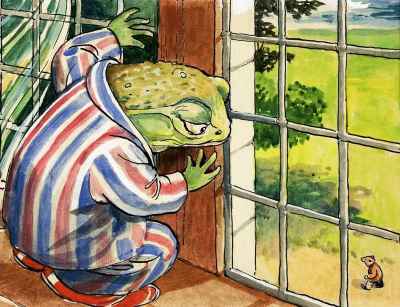
"Now you look out Rat! When Toad's quiet and submissive, and playing at being the hero of a Sunday-school prize, then he's at his artfullest. There's sure to be something up." (Badger's advice to Ratty, Chapter Six, Mr Toad).
Expect a revised Government Motion - no doubt only coincidentally addressing the concerns of ardent Brexiteers - on what can and cannot be disclosed - shortly therefore.
Interestingly, Mr Duncan Smith asked Mr. Speaker if a fresh Government Motion might negate any question of Contempt attaching to the present Motion requiring full disclosure of Brexit assessment information.
The picture is something like the efforts of Badger, Mole and Ratty (here representing the legislature) to persuade the errant Mr. Toad (here the executive, spurred by some enthusiastic quarters of the Government benches keen to ensure that the Article 50 process is not derailed) to moderate Mr. Toad's recalcitrant stance.
Of course Mr Toad was able to escape from constraint with a clever ruse, some knotted bed sheets and a convenient open window.
This all seems to reflect an emerging Cold War within the House of Commons where the first skirmish – any scope for an allegation of Contempt coming to fruition - is likely to be diffused by the Secretary of State demonstrating some contrition and humility before the Select Committee and allowing access to the information requested on the 1st November with some new consensual conditions.
The likely condition for full disclosure was identified by Barry Sheerman (Lab Coop) Huddersfield who suggested following established practice affording the Committee Chair, Hilary Benn, full disclosure; with discretion to filter the information as the Chair sees fit.
Those favouring EU exit appear to be rather conspicuous in their apparent calm and seemingly orchestrated contributions. That might possibly suggest that there is something damaging to the cause of those who favour a 'hard Brexit' in the redacted material.
But this parliamentary Cold War will be subtle and sophisticated – fought with the ink of revised Motions and countered by the pressure of threatened Contempt.
Kenneth Clarke (Con) MP for Rushcliffe warned that the Government “could not [by qualifying or editing the documents without amendment on 1st November], post-Brexit , start reducing parliamentary sovereignty”.
Indeed as the debate closed with Points of Order, Ken Clarke suggested that the Government’s novel abeyance of voting on Opposition Motions was turning the House into a debating chamber without parliamentary accountability.
The Government should be accountable to all its responsibilities to the House said Mr. Clarke. Mr Speaker agreed that the Government’s approach had not been helpful.
Two amendments seem to have been required; by Oscar Wilde and the present Government.
Oscar Wilde’s eloquent address was not sufficiently humble and lacked the common touch.
The Humble Address lacked sufficient eloquence and the Government's touch is driving the Commons wild.
Sometimes the personalities in a courtroom can cause particular interest.
Laurence Olivier's authorised biography, Olivier, by Terry Coleman, tells of the moment an individual who seemed to be one of the solicitors innocuously sitting at the side of the court - in a case where the Director of Public Prosecutions had taken an interest in an English Stage Company production at the Royal Court Theatre - rose to give evidence in the witness box.
This wasn't a solicitor. Coleman tells of his astonishment that it was Laurence Olivier demonstrating his 'astounding ability to make himself invisible'.

"I knew him Horatio". Yet nobody recognized Olivier.
This may, possibly, have been during proceedings resulting from the Lord Chamberlain's antipathy towards John Osborne's 1965 play A Patriot for Me.
Before being stripped of the power of theatre censorship on September 26th 1968, the Lord Chamberlain's office had suffocated work by Ibsen and Arthur Miller amongst others. Even Becket had to wait a little longer for Godot while the Lord Chamberlain engaged in moral deliberation.
However it is another, largely invisible, personality who turned out to be the most famous litigant of all time on the law's stage.
She preferred to be known as Mabel Hannah.
Her remarkable role in one of the world's most influential cases is considered with fresh eyes in the Vancouver Bar Association's journal, The Advocate and the insight is flagged anew by the excellent website of the Scottish Council of Law Reporting.
What is particularly interesting for anyone with an interest in Donoghue v Stevenson (because Mabel Hannah was the preferred name of May Donoghue) is that the SCLR provide a photograph of Mabel - the most famous litigant of all time:
http://www.scottishlawreports.org.uk/resources/dvs/most-famous-litigant.html
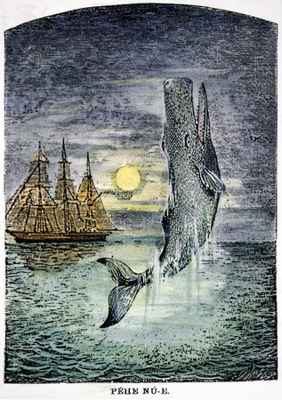
Moby Dick breaches in the moonlight in sight of Captain Ahab's Pequod (Britannia Images)
On the anniversary of the publication of Herman Melville's Moby Dick in 1851, the House of Commons begins Committee Stage of the European Union (Withdrawal) Bill.
As the Explanatory Notes to the bill tell us:
"The Bill ends the supremacy of European Union (EU) law in UK law and converts EU law as it stands at the moment of exit into domestic law".
In the background some earlier inter-state arrangements are being reviewed.
Currently submerged legal instruments are being revealed as the EU tide ebbs.
One such instrument is the London Fisheries Convention signed on behalf of the Government of the United Kingdom and Northern Ireland in 1964 by Rab Butler, Conservative Minister and MP for Saffron Walden.
The London Fisheries Convention regulated the use of territorial waters for fishing.
"The London Fisheries Convention, signed in 1964 before the UK joined the European Union, allows vessels from five European countries to fish within six and 12 nautical miles of the UK's coastline. It sits alongside the EU Common Fisheries Policy (CFP), which allows all European vessels access between 12 and 200 nautical miles of the UK and sets quotas for how much fish each nation can catch."
https://www.gov.uk/government/news/uk-takes-key-step-towards-fair-new-fishing-policy-after-brexit
The UK Government have triggered another two year withdrawal process - this time article 15 of the London Fisheries Convention and this time the notification is to the UK Government (so Mr. Gove's denunciation will presumably have been to the Secretary of State for Environment, Food and Rural Affairs... Mr. Gove).
The UK's membership of the EEC, from 1st January 1973, did not initially bring a Halcyon calm to disputed fishing rights between states.
The Cod Wars which boiled between Iceland and the UK like a political Corry Vreckan and peaked in the mid-1970s evidence that:
https://www.britishpathe.com/video/peacetime-sea-battle/query/icelandic+sea+fishing
Iceland (not an EU member) now has an exclusive economic zone (EEZ) of 200 miles and this is accepted internationally other than in the EU where the Common Fisheries Policy takes precedence.
So the UK's withdrawal from the EU opens further dynamics of acceptance and recognition.
Indeed the issue may even bear on public opinion in Iceland regarding EU accession sentiment which, currently, opposes membership.
The doldrums
Whether a result of the adverse impact on UK fishing arising from membership of the EU or otherwise, some emollient, seemingly spread over recent decades by an invisible hand, has calmed the troubled waters which had previously kept the Cod Wars simmering for so long.
The perfect storm
However that period of stability should not be taken for granted. The UK Government's clearing the flotsam and jetsam of earlier regulation such as the London Fisheries Convention, Brexit and economic impact may create a political storm to match Poseidon's fury.
Fishing, politics, resources and law seem inevitably to be gathered in a disputatious relationship.
"But why should the king have the head, and the Queen the tail? A reason for that, ye lawyers?"
(Herman Melville, Moby Dick 1851, Chapter 90)

Good news for bees (picture from Britannia Image Quest). Good news for everybody.
"The weight of evidence now shows the risks neonicotinoids pose to our environment, particularly to the bees and other pollinators which play such a key part in our £100bn food industry, is greater than previously understood," said Mr Gove.
"I believe this justifies further restrictions on their use. We cannot afford to put our pollinator populations at risk."
http://www.bbc.co.uk/news/science-environment-41931670
This blog might contain posts that are only visible to logged-in users, or where only logged-in users can comment. If you have an account on the system, please log in for full access.
